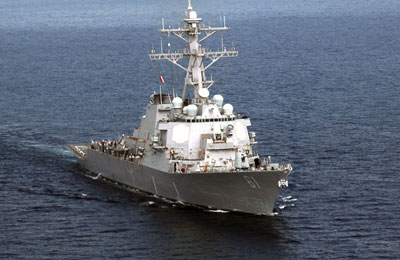
The guided-missile destroyer USS Ramage
in the Arabian Gulf.
US, allies prepare for military strike on Syria
Amman, August 28, 2013
The United States and its allies geared up for a probable military strike against Syria that could come within days and would be the most aggressive action by Western powers in the Middle Eastern nation's two-and-a-half-year civil war.
Western envoys have told the Syrian opposition to expect a military response soon against President Bashar al-Assad's forces as punishment for a chemical weapons attack last week, according to sources who attended a meeting with the rebel Syrian National Coalition in Istanbul.
Amid a quickening drumbeat of preparations, Australia, a close US ally and incoming chair of the United Nations Security Council, on Wednesday endorsed possible action against Syria even if the security council fails to agree.
US Defense Secretary Chuck Hagel said on Tuesday that American forces in the region were "ready to go" if President Barack Obama gave the order.
Obama - long reluctant to intervene in the Syrian conflict - worked to solidify allied support, including calling the leaders of Britain and Canada, while US intelligence agencies assembled what they are sure to say is final confirmation of the Syrian government's culpability for Wednesday's poison gas attack near Damascus.
White House spokesman Jay Carney said it would "fanciful" to think that anyone other than Assad's forces was behind the large-scale chemical attack, which activists said killed hundreds of people as they slept.
"There is no doubt who is responsible for this heinous use of chemical weapons in Syria: the Syrian regime," Vice President Joe Biden said at a speech in Houston to the American Legion, a military veterans' group.
Top US national security aides gathered to review the situation on Tuesday night in a meeting chaired by Obama's national security adviser Susan Rice, officials said.
Obama has yet to make a final decision on the US response, Carney said, but left little doubt that it would involve military action. He insisted, however, that Washington was not intent on "regime change," signalling that any military strikes would be limited and not meant to topple Assad.
The British military was also drafting plans. Prime Minister David Cameron, anxious, like Obama, not to emulate entanglements in wars in Afghanistan and Iraq that beset their predecessors, said any strikes would be "specific" so as not to drag the allies deeper into Syria's civil war.
Cameron, who spoke to Obama on Tuesday for the second time in four days, recalled parliament for a debate on Syria on Thursday.
UN chemical weapons investigators put off until Wednesday a second trip to the rebel-held suburbs of Damascus where the chemical attack took place.
While evidence of chemical warfare could bolster an argument for intervention at the UN in the face of likely Russian and Chinese opposition, Western leaders and the Arab League have already declared Assad guilty.
Ahmad Jarba, president of the Syrian National Coalition, met envoys from 11 countries at an Istanbul hotel, including the US ambassador to Syria, Robert Ford. The rebel leaders proposed targets for cruise missiles and bombing.
One participant said: "The opposition was told in clear terms that action to deter further use of chemical weapons by the Assad regime could come as early as in the next few days."
Planning appears to focus on missile or air strikes. There is little public support in Western countries for troops to invade Syria.
The precise timing of possible military action remained unclear, but it is certain to wait for an official U.S. intelligence report expected to blame Assad's government for the chemical attack. The findings, considered merely a formality at this point, will be released this week, U.S. officials said.
Obama will go ahead with a speech on Wednesday at Washington's Lincoln Memorial to mark the 50th anniversary of slain civil rights leader Martin Luther King Jr.'s 'I have a dream' speech.
"The clock is ticking, and the administration is not going to want that to tick too long," said Adam Schiff, a Democrat on the House of Representatives intelligence committee, as White House aides broadened consultations on Capitol Hill.
MOOD IN DAMASCUS
Syria's government, backed by Iran, denies gassing its own people and has vowed to defend itself, but residents of Damascus are growing anxious.
"I've always been a supporter of foreign intervention, but now that it seems like a reality, I've been worrying that my family could be hurt or killed," said a woman named Zaina, who opposes Assad. "I'm afraid of a military strike now."
Firm opposition from Russia and China, permanent members of the Security Council, all but rules out a UN mandate of the kind that gave legal backing to Nato air strikes that helped Libyan rebels unseat Muammar Gaddafi two years ago.
"Our preference, everyone's preference, would be for action, a response, under United Nations auspices," Australian Foreign Minister Bob Carr, whose country takes over the rotating chair of the Security Council on Sunday, told reporters.
"But if that's not possible, the sheer horror of a government using chemical weapons against its people, using chemical weapons in any circumstances, mandates a response."
Although Obama has long said Assad should step down, he is unwilling to commit to making that happen by force. White House spokesman Carney said it was "profoundly in the interests of the United States" to respond to the chemical weapons attack. - Reuters







